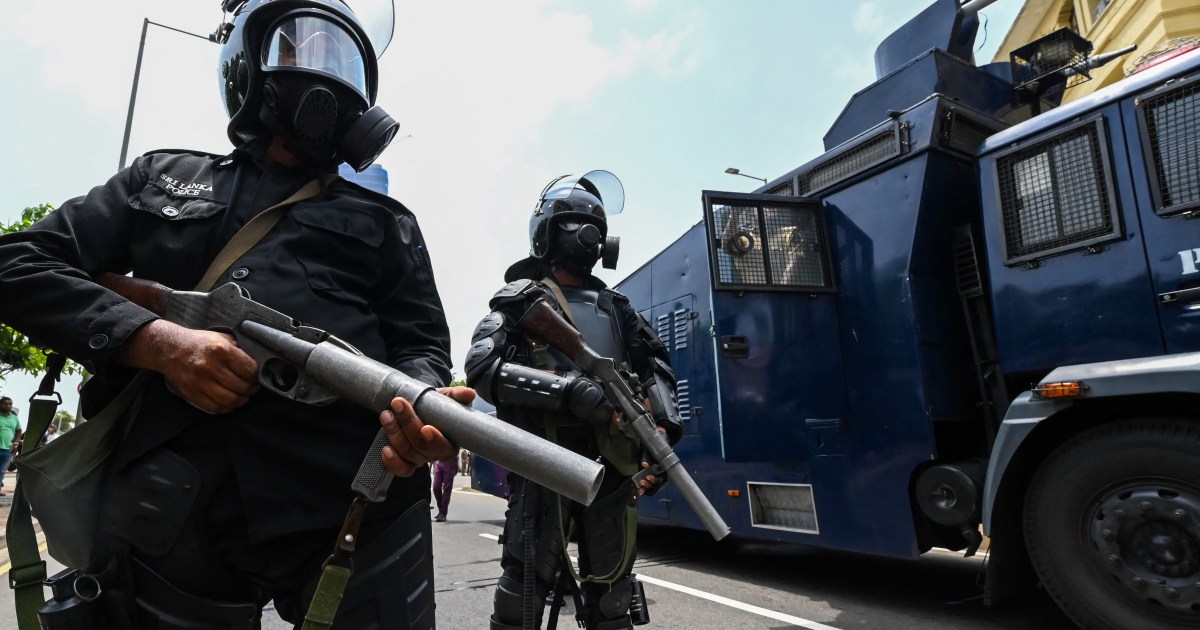Angry Egyptians denounce staged pro-Palestine rallies amid Israel-Hamas war
Cairo, Egypt – On a sunny Friday in Cairo, buses waving both the Palestinian and the Egyptian flags arrive at El-Nasr road in the district of Nasr City.
The Friday prayer has ended and, with it, the only moment of silence that the Egyptian capital ever regularly witnesses.
Protest chants are about to fill the air, as the bus doors swing open and a crowd of mostly young men hit the pavement, holding aloft the flags and portraits of Egyptian President Abdel Fattah el-Sisi.
Critics say el-Sisi’s administration has been organising staged protests like this one to rally support for his embattled government, by piggybacking on public sympathy for Palestinians as the death toll from Israel’s war on the Gaza Strip ticks higher.
The bus itself is emblazoned with the logo of el-Sisi’s The Nation’s Future party. Event organisers, believed to be undercover police officers, start to direct the protest participants, telling them where to go and what to chant.
“We are with you! Go Sisi!” the protesters chant. They march with signs in their hands that convey messages in both Arabic and English: “We support the Palestinian cause, and we support the president’s decisions.”
The demonstration winds its way towards the Unknown Soldier Memorial, a pyramidal monument in honour of the Egyptians and Arabs who lost their lives in the 1973 October War.
There, microphones and a stage have been set up for accredited media to document the scene, with the help of several drones that fly above the attendees.
“It was a comedy show. Most people who were there were hired or paid to come,” one pro-Palestine supporter – who asked to remain anonymous for fear of repercussions – told Al Jazeera, after deciding not to join the rally. “Proof of that is that we saw buses in the city centre saying they were ready to give you a ride to the gathering’s location for free.”
Hossam el-Hamalawy, Egyptian journalist and scholar-activist now based in Germany, also said that “there were directives by the different ministries to take to the streets in these mobilisations, as well as the state-backed trade union federations, who also mobilised their workers”.
“The state-organised protests are, simply put, strategic ways in which the state exploits Egyptian society’s deprivation of political freedom and expression to manipulate the masses and further state propaganda,” another pro-Palestine demonstrator told Al Jazeera, likewise asking for their identity to be withheld.
Photos taken of the protest would be used to create propaganda, showing “public support for the regime”, ahead of December’s presidential elections, this protester claimed.

‘They started beating the protesters heavily’
Both of the pro-Palestinian supporters said they would go instead to Mostafa Mahmoud Square, where a grassroots gathering was set to take place.
However, the police reportedly made the gathering in the square dissolve, as happened with a similar pro-Palestinian demonstration in the Al-Azhar mosque that same day.
The demonstrators ultimately started marching towards a symbolic place in the history of Egypt’s protest movements: Tahrir Square. The 2011 Arab Spring protests converged there, culminating in the removal of then-President Hosni Mubarak.
According to the attendees, as people began to arrive in the streets surrounding the square on Friday, armed forces stepped in to prevent a large gathering from forming.
However, large groups running towards the square were able to overcome the police line, and a large demonstration formed, with participants chanting: “The people want the fall of Israel.”
“It was the first time that we entered Tahrir – in a protest – since 2013,” one of the protesters who refused to go to the government-organised demonstration said. But their presence in the square would not last for long.
“Not long after the people bravely stood in Tahrir to protest, the police and security forces in civilian clothes and the thugs started using brute force to evacuate the protesters and intimidate them,” the second Pro-Palestinian supporter who spoke to Al Jazeera said. “They started beating the protesters heavily and chasing them away, out of the square.”
According to independent Egyptian news outlet Mada Masr, 43 people were arrested. The second protester said they and other participants in the rally “don’t know the status of those arrested as of now and aren’t certain what their fate is”.
The el-Sisi government has long been accused of systematic political repression and censorship, including by groups like Amnesty International.
Human Rights Watch, for instance, accused Egyptian forces of committing “arbitrary arrests, enforced disappearances and torture of real or suspected political activists as well as ordinary citizens”.
“Sisi has crushed dissent over the past 10 years from his coup, and the protests at this point are significant,” said El-Hamalawy, who focuses on the repression of the state apparatus in Egypt in his research. “Palestine, once again, is reviving street dissent. During the first week of the attacks, spontaneous protests broke out on a small scale, and the regime felt alarmed.”
“The Palestinian cause is the most politicising factor for the Egyptian youth and the Egyptian public opinion,” El-Hamalawy added. “After all, the 2011 revolution was the climax of a process of dissent that started in the country in the year 2000, with the second Palestinian Intifada.”

Gaza’s suffering ‘just a few hours away’
This lack of freedom angers many Egyptians who hope to protest in support of Palestinians without fear of reprisals.
They fear the only safe way to protest is under the explicit command of Egyptian officials.
“They’re basically exploiting our anger, frustration and lack of political freedom – and freedom of speech, thought and expression – to persuade, manipulate and even bribe us into demonstrating in favour of them,” the second pro-Palestinian protester said.
The violence and proximity of the conflict have left them shaken. Gaza – the site of a continuing Israeli bombardment – shares a border with Egypt.
“For how long are we going to stand by and watch as people in Gaza, just a few hours away from us, are forced to live in the cruel, inhumane conditions enforced by the cruel, brutal occupation forces?” they asked. On Saturday, the first convoy of a few aid trucks crossed the Rafah border from Egypt to Gaza.
The grassroots outrage at the mounting Palestinian death toll has even bled into the government-organised protest. Witnesses claim that “true protesters” started gathering there, only to be expelled by Egyptian armed forces.
“I think it was a big mistake of the regime to orchestrate what we saw in Nasr City, because they made it about themselves,” the other pro-Palestinian supporter said.
His fellow protester chimed in. “I can’t help but feel hopeless and helpless,” they said.
“To be able to exercise any form of solidarity with Palestine beyond just my phone screen, I have to choose between demonstrating in safer conditions but feeding into the state’s agenda – both related and unrelated to Palestine – or demonstrating in grassroots protests that I feel represent me and my views, beliefs and values but risk my safety and freedom.”




